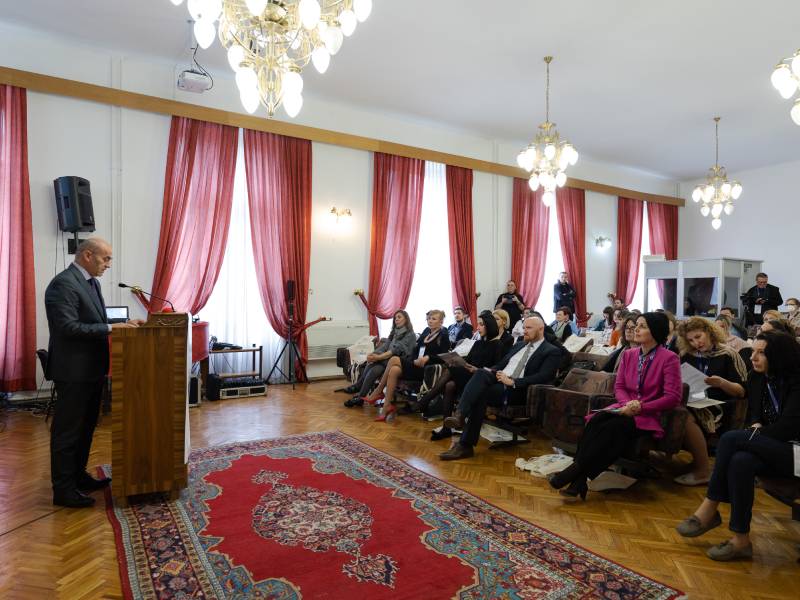‘Beyond Fear and Silence: Universities against Violence’, the international conference, was held on May 6 and 7 2022, at the Rectorate of the University of Sarajevo. During the two Conference days, over 70 Bosnian-Herzegovinian, regional and international scholars discussed gender-related issues in the field of higher education. In two days, and through 8 parallel panels, over 30 papers by authors from Bosnia and Herzegovina, Montenegro, Croatia, Slovenia, Serbia and Austria and the United Kingdom were presented. The conference was opened by Prof. Dr Kirsten Campbell’s (Goldsmiths, University of London, UK) lecture on violence as a feminist problem and producing knowledge on sexual and gender-based violence. Language and gender were the subject of the first panel, moderated by Prof. Dr Ajla Demiragić. The panel looked at the possibilities, perspectives and possible limitations of the introduction of gender-sensitive language at the university level. The panel highlighted the importance of exploring this topic. It also highlighted the importance of developing public policies that would include the use of gender-sensitive language and in which, in addition to linguists, public policy experts and all interested in this issue would participate. Panel 2 (Gender, Body and Violence) was moderated by Prof. Dr Jasmina Husanović, and its presentations regarded the following topics: instrumentalization and commercialization of the female body through a culture of beauty and embellishment, the consequence of imposing ideals of femininity, as well as the politics of (in)body satisfaction and active reshaping, motivation and rationalization of the culture of beauty and embellishment through the tropes of “health” and “self-confidence”, but in essence mostly through “attraction” as a goal, internalization of these regulatory and disciplining norms under the pressure of the media culture, the connection of liberal political belief with a greater degree of awareness about the problem of gender-based violence, as well as the skill to recognize it, the influence of pregnancy on violent patterns of behavior within the framework of gender relations in BiH, the importance of collective action towards social security for women, and the issue of solidarity versus the issue of competitiveness between women. Panel 3 (Gender stereotypes: in culture and education) was moderated by Prof. Dr Nerzuk Ćurak. The panel questioned broader contexts that allow barriers to be created in the fight against gender-based violence, with a focus on family violence. We are witnessing a lower representation of teaching content on gender-based and domestic violence. On the other hand, female students, future professionals who will work to prevent violence and support victims, represent attitudes that indicate a conservative attitude towards equality and heritage gender stereotypes. What is the role of religion in combating stereotypical understanding of gender roles, and what is its power to influence positive developments? Panel 4 was moderated by Prof. Dr Amila Ždralović, and various methodological and theoretical challenges to feminist research were mapped through this panel. The starting points of the panel were methodological approaches and challenges in the design and implementation of feminist research itself, especially when it comes to qualitative methodology. The question of research ethics was also opened, but also the question of how much through feminist research, that takes gender and specific female experiences as a central category of analysis, has changed (and refined) research procedures. The lecture by Prof. Dr Anna Bull (Department of Education, University of York, UK) on tackling faculty/staff sexual misconduct in higher education in the UK closed the first working day.
The second day began with parallel panels 5 and 6. Panel 5 (Media, Education and Gender-Based Violence), moderated by Prof. Dr Valida Repovac Nikšić, was a kind of continuation of the previous Gender and Language panel, given its choice of topics and discussed issues. The panelists’ presentations were focused on the results of empirical research. Panel 6, moderated by Prof. Dr Jasna Kovačević, opened the topic of sexual harassment in an academic environment and presented concrete data and facts about academic institutions often being a place of misogyny, visible and invisible gender-based harassment and violence. Ana Belén Amil (Gender Equality Officer, SUPERA Project, of Central European University, Vienna, Austria) gave a lecture on combating sexual harassment in higher education and policy innovations. Panel 7 raised issues of gender discrimination and institutional policies (moderated by Miroslav Živanović, MSc). Laws define sexual harassment, but even these definitions themselves are imprecise and inadequate. The application of affirmative measures in favor of the less represented gender in the field of higher education was also discussed. Two problems arise when it comes to these affirmative measures – it is not known whether these measures are successful, what raises the question of whether affirmative measures are really an adequate response to gender inequality in higher education. The final panel was 8 (Gender inequality in professional life) and was moderated by Prof. Dr Duško Trninić. The presented papers addressed the inequality of women in employment and career development from different angles. Among other things, this panel emphasized that it was important for gender action plans to be adopted at the university-level on the basis of data. Prof. Dr Biljana Kašić, feminist and postcolonial theorist from Zagreb, closed the conference with her lecture on the relationship between epistemic and gender-based violence at university, its intersections and contradictions.
The TPO Foundation and the University of Sarajevo (UNSA) were the organizers, and the co-organizers were: Džemal Bijedić University of Mostar (UNMO), International University of Travnik (IUT), University of Banja Luka (UNBL), University of Bihać (UNBI), University of Donja Gorica (UDG), University of East Sarajevo (UES), University of Hercegovina (SVEHER), University of Montenegro (UCG), University of Mostar (SVEMO), University of Novi Sad (UNS), University of Zagreb (UNIZG) and University of Zenica (UNZE).
The University and Gender Mainstreaming (UNIGEM) Project is supported by the UK Government.






















